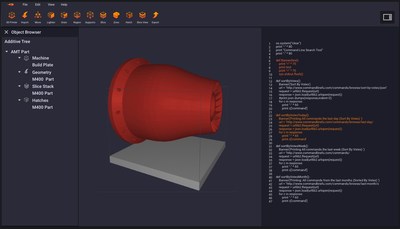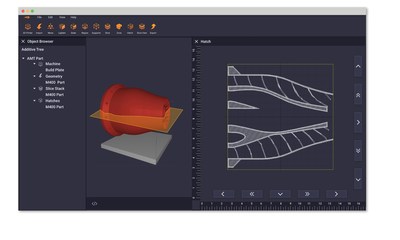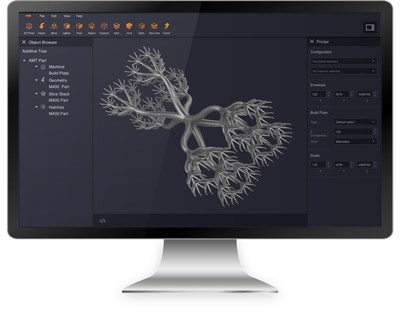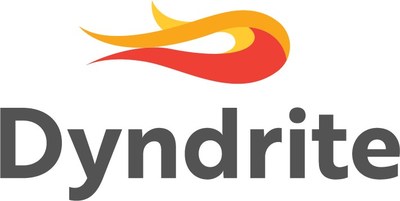Dyndrite's new geometry kernel unlocks the power of GPUs; Python interface revolutionizes accessibility of design and manufacturing software. The Dyndrite Additive Toolkit enables a streamlined CAD-to-Print workflow that introduces new levels of productivity and efficiency in the Additive Manufacturing industry.
CHICAGO, March 31, 2019 — (PRNewswire) — Today at AMUG 2019, after 3.5 years of development, Dyndrite Corporation emerged from stealth, launching the Dyndrite Accelerated Geometry Kernel (AGK) — the world's first fully GPU-native geometry engine, along with the Dyndrite Additive Toolkit, the first application built on the new kernel.
The Dyndrite Kernel and Additive Toolkit represent a milestone in CAD/CAM development, bringing modern computing, language and capabilities to developers and OEMs developing next-generation applications and devices for designers, engineers, and 3D printing technicians. The Dyndrite Kernel is a "Hybrid" kernel capable of representing all current geometry types, including higher order geometries such as splines (NURBs), surface tessellations, volumetric data, tetrahedra, and voxels. Additionally, users can seamlessly move between geometric representations without destroying the original underlying data format. The fully native GPU Kernel easily handles additive specific computations such as lattice, support, and slice generation, in some cases reducing compute times from hours or days to minutes or seconds. For heavy use cases, the Dyndrite kernel is naturally scalable with access to additional GPU nodes, whether locally or in the cloud.
"I've spent my career working on software built to enable designers, engineers and technicians," said Dr. Laura Lurati, Chief Scientist at Dyndrite, Ph.D, Applied Mathematics. "Today with the release of the Dyndrite platform, we dramatically improve the daily working lives of additive manufacturing users. I'm excited to see the innovative solutions our users create with these powerful new tools."
"The Dyndrite Accelerated Geometry Engine is a great example of innovation enabled by using the latest NVIDIA GPU programming techniques and the RTX platform," said Olimpio DeMarco, Director, Strategic Alliances, NVIDIA. "Today's designers and engineers are clamoring for state-of-the-art tools, built on modern architectures, that leverage today's manufacturing processes such as 3D printing. We're excited to see the applications enabled by this powerful new platform."
The Dyndrite kernel provides both C++ and English-readable Python APIs, making application development accessible to a wide variety of users, including non-programmers such as students, mathematicians, and mechanical engineers. Using the Dyndrite Python APIs solution, providers and OEMs can easily and quickly develop sophisticated next-generation applications and interactive workflows.
The Dyndrite Additive Toolkit is the first customer-facing application built on the new Dyndrite kernel. It is designed to improve the productivity of 3D printing technicians. It streamlines the CAD-to-Print process by directly importing CAD design files, maintaining the original spline data, and using that data to drive the additive manufacturing process. Working directly with CAD data provides numerous advantages over STL files, a pervasive format used in today's additive systems. The STL is a 30-year-old format that, while helping to launch the 3D printing revolution, now serves as a major bottleneck in additive workflows. STL files are difficult to safely modify, and typically require time-consuming manual repair work prior to being used. Additionally, their fixed reliance on triangles limits the precision of the workflow model and the output quality.
Working directly with CAD spline data, and the richer information it provides, enables Dyndrite users to eliminate model prepping steps and do on-the-fly determinations on desired output quality. The underlying GPU-based kernel means other additive workflow processes which used to take hours of processing time ‒ such as creating lattices or lightweighting, support generation, slicing, hatching, and toolpath generation — now occur on the fly. By removing the long click and wait times, designers are now free to experiment and explore iterations as a natural part of the design workflow. Users have the choice to use the Toolkit's GUI, or the Python interface to script a significant part of their workflow. Interactive workflows which call up GUI elements for user input can also enable technicians to augment their workflow creating interactive scripts that eliminate and automate repetitive and mundane tasks.
"Dyndrite is delivering on the promise of modern design and manufacturing," said, Harshil Goel, Dyndrite's co-founder and CEO. "We are excited to play an important role in fostering the evolution of design and manufacturing software."
"I've known Harshil for quite a few years now," said noted private investor and former Autodesk CEO Carl Bass. "I believe that he and his team are taking a very fundamental approach to solving a class of problems even broader than the current generative design use cases. Dyndrite has the opportunity to transform an industry and power some pretty awesome next generation workflows."
Dyndrite's announcement is the culmination of more than three years of development work by a veteran team of mathematicians, computer scientists, and mechanical engineers who came together with the aim of empowering both application developers and OEMs creating next-generation fabrication processes and machines. Dyndrite takes a holistic and inclusive approach with the aim of powering integrated hardware / software solutions that increase user control over the printing process while protecting manufacturers' underlying intellectual Property (IP).
"The Dyndrite Accelerated Geometry Kernel promises to do for 3D printing what Adobe and PostScript did for 2D printing in the 1980's," said Shawn Hopwood, Dyndrite's Chief Marketing Officer and Head of Developer and OEM Relations. "Laser printing technology powered by PostScript set off a revolution that forever changed how people communicate. In the new revolution, 3D printers powered by Dyndrite have the potential to change every aspect of the things we make, where we go, and how we live."
"As EOS continues to break boundaries and push the frontier of additive manufacturing, we pride ourselves in forming collaborative relationships to be able to offer our customers the best and state-of-the-art technology," said Dr. Gregory Hayes, Director of Applications and Consulting for EOS. "We are excited to be working with Dyndrite, and looking forward to how their software can streamline and improve the design to part workflow."
The company has independently announced the Dyndrite Developer Program and Council, a membership group comprised of industry leaders chartered with steering the future direction of the company's roadmap. Inaugural members include:
(Listed in alphabetical order)
Aconity3D
EOS
HP
NVIDIA
Plural Additive Manufacturing
Renishaw
(see full release)
Availability
The Dyndrite Kernel is available to select developers and OEMs. Parties interested in learning more should go to
https://www.dyndrite.com/developer. The company intends on broader availability Summer 2019.
The Dyndrite Additive Toolkit is in limited release and will go in public beta later this summer. Additive users can sign-up for the beta program at https://www.dyndrite.com/beta
About:
Dyndrite Corporation (Pronounced "Den-drite"), provides the first of its kind "Computational Geometry Engine" and Additive Toolkit (AT) which combine to bring modern performance, capabilities, and productivity to the design, engineering, and manufacturing marketplaces. The full power of Dyndrite is accessible via an integrated Python Application Programming Interface (API) providing unprecedented control and customization to developers, engineers, technicians, and device OEMs.
Contact:
Shawn Hopwood, CMO Dyndrite
shopwood@dyndrite.com
All trademarks, service marks and company names used in this announcement are the property of their respective owners.




![]() View original content to download multimedia:
http://www.prnewswire.com/news-releases/dyndrite-corporation-reveals-new-accelerated-geometry-kernel--the-worlds-first-fully-gpu-native-geometry-engine-releases-additive-toolkit-for-3d-printing-technicians-300821501.html
View original content to download multimedia:
http://www.prnewswire.com/news-releases/dyndrite-corporation-reveals-new-accelerated-geometry-kernel--the-worlds-first-fully-gpu-native-geometry-engine-releases-additive-toolkit-for-3d-printing-technicians-300821501.html








